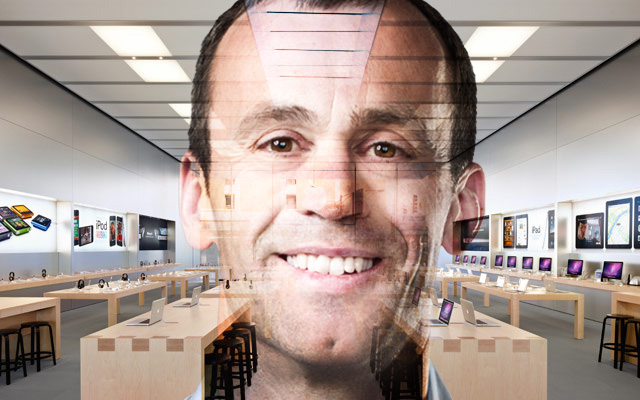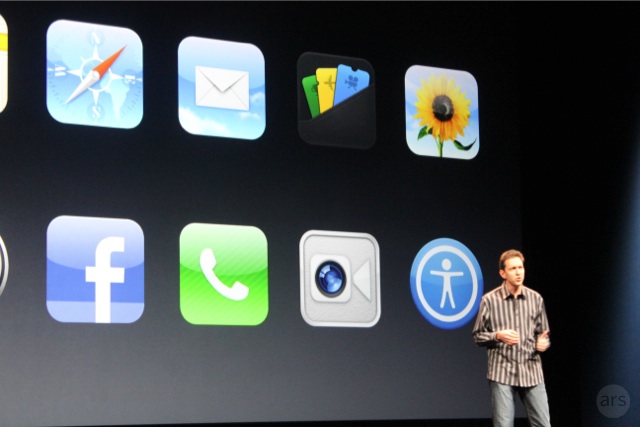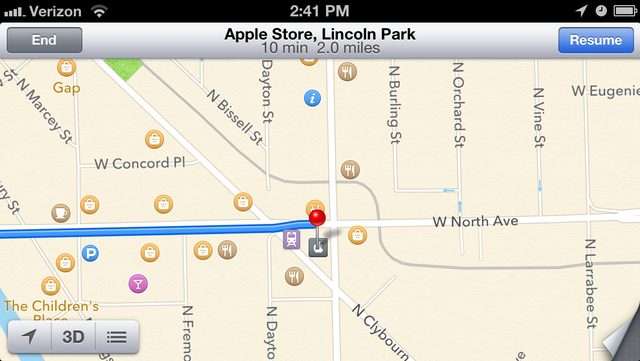2012 was certainly a year of change at Apple, though the company made more money and sold more devices than ever. From the consumer side, it's hard to argue with retina MacBook Pros and new iPads—especially when they come out ahead of schedule. But from within Apple, the changes were much more significant.
Over the last year, four important Apple executives left the company. One of those execs was hired and fired within that year. Another chose to retire, only to take a few steps back several months later. We thought we'd take a look at these four and what roles they played within the Apple ecosystem to see what all the fuss was about—for better or for worse.
John Browett: Apple retail

Apple announced in January of 2012 that it hired John Browett in order to place Ron Johnson as retail head. Right from the beginning, Browett's appointment was controversial—he had previously been CEO of Dixons Retail in the UK, which had an increasingly poor reputation for its messy stores, annoying staff, and "appalling" customer service. He seemed to be the exact opposite of what Apple would have been looking for to replace Johnson, who built Apple's retail presence from the ground-up as being clean (both in the traditional sense and aesthetically), easygoing, and customer-friendly.
Apple's stores performed fine under Browett; throughout 2012, the company continued to pull in almost unrealistic sales numbers per square foot compared to other high-end retailers. But from the inside, things were looking ugly. Numerous Apple retail employees told Ars about mismanagement at their stores, the cutting back of cleaning staff, tighter Genius Bar bookings, and other cost-cutting, revenue-boosting measures.
That's why, when it came out in October that Browett had been shown the door, not one single outsider seemed surprised. Apparently, even some insiders agreed.
"John Browett seemed like a bad hire from the outside, and apparently the people inside Apple agreed—eventually," Ars contributor John Siracusa said. "It's somewhat heartening to see Tim Cook take decisive action to correct his mistake, but avoiding the mistake in the first place would have been even better."
AllThingsD has begun guessing at who could be Browett's replacement as we go into 2013. The list includes executives from Coach, Nike, Starbucks, Burberry, and Disney, all revered for their strong international presence.
Bob Mansfield: hardware engineering

"If hiring John Browett was a mistake, then allowing Bob Mansfield to leave was an even bigger one," said Siracusa.
Indeed, when it became public in June of 2012 that Apple's hardware engineering head Bob Mansfield was retiring, the announcement was met with howls from employees and Apple-watchers alike. Mansfield had been part of Apple since 1999 and spent much of his time there working on the products we know and love. Apple said it was replacing Mansfield with VP of iPad engineering Dan Riccio.
Two months later, Apple made another surprising announcement. Riccio was still taking over as SVP of the hardware engineering group from Mansfield, but Mansfield had apparently decided to stay on board as an advisor to the engineering team to "work on future products," said Apple.
Mansfield's decision to reverse course on his retirement was uncharacteristic, but largely accepted by those relieved that Mansfield's expertise would remain at Apple for a while longer. It came out months later that Mansfield may have decided to stay on board—in part—due to iOS software head Scott Forstall's departure (coming up next). Forstall and Mansfield reportedly clashed over Forstall's "confrontational management style," but Mansfield was allegedly willing to commit to more time at Apple once he knew Forstall would be leaving.
That story may have ultimately had a happy ending for Mansfield and his fans, but Siracusa pointed out the whole incident made Apple look like it was fumbling in the public eye.
"It's much easier to fire a bad employee than to hire and retain a good one. Obviously, Tim Cook wants Bob Mansfield at Apple. His departure and strange, nearly immediate return was an embarrassment, and a black mark on Tim Cook's record as a manager. But again, credit Cook for fixing his mistake quickly and ending up in a good final position," Siracusa said.
Scott Forstall: iOS software

Even more shocking than Mansfield's retirement (then un-retirement) was the ousting of iOS software head Scott Forstall. The announcement about Forstall's departure came at the same time as Browett's, signaling an attempt within Apple to correct course and go into 2013 with a stronger team. But Forstall had been a confidant of Steve Jobs, and although he wasn't everyone's favorite person to work with, he was respected for his work ethic and high standards.
Immediately after the announcement, sources started coming out of the woodwork to talk about the reasons they believed Forstall was shuffled aside. As mentioned above, Forstall apparently clashed with numerous other high-profile executives, including designer Jony Ive and Bob Mansfield. The situation was reportedly so tense that many execs wouldn't meet with him in a room alone without some kind of mediation from Cook.
But it's easy to hate on a strong personality—especially from the outside. Those who have followed Apple through the decades took a more nuanced view of what happened.
"It's not surprising to see a lot of Forstall bad-mouthing from anonymous Apple sources in the wake of his departure—history is written by the winners, after all—but it's unfair to assume that all of those things are true," said Siracusa.
"What we do know from the outside is that Forstall was in charge of iOS, and the last two releases of iOS had headline features that failed to live up to Apple's own standards. Siri's release as a 'beta' was an attempt to deflect some criticism, but it also highlighted Apple's own dissatisfaction with the feature. As for iOS 6's new Maps application, Tim Cook summed it up well: 'We screwed up.'"
But, as Siracusa points out, those two things may have been embarrassing, but are they really grounds for a firing?
"Probably not. But throw in some personality conflicts and add a new CEO with a 'deep belief that collaboration is essential for innovation' and the conditions are ripe for Forstall's ouster," Siracusa said.
"Whatever Steve Jobs's feelings were about collaboration, he obviously liked Forstall. Jobs promoted him until he was in charge of Apple's most important software product. Tim Cook's dismissal of Forstall is a sign that he's finally asserting his own values on Apple's leadership. I think Cook was wise not to clean house the day he took over as CEO, but I'm glad he finally seems to have come to a decision about something that was clearly a source of tension inside Apple."
Richard Williamson: iOS Platform Services

Richard Williamson was probably the least high-profile of the execs who left Apple in the last year, but his departure is worth noting because of the alleged reason behind it. He was Senior Director for iOS Platform Services and worked under Scott Forstall, and was reportedly tasked with heading up the new version of Maps for release with iOS 6.
We all know how the Maps thing played out—not well. Apple's head of Internet services Eddy Cue apparently had enough and fired Williamson in late November, not long after Scott Forstall. But even though Williamson wasn't in the limelight as much as some of the others, he had been a major player in Apple's mobile strategy for many years. As noted by Bloomberg, Williamson came from the NeXT world and helped to develop software for the original iPhone; he is named on numerous patents for the iPhone as well.
As such, his firing was no small matter. Clearly, the poor reputation earned by iOS 6's Maps app embarrassed Apple to its core, and its remaining execs would rather move into the new year with a team that doesn't overlook major flaws before shipping a final product.
Where do we go from here?
2012 was the first full year in which Tim Cook led Apple without Steve Jobs at his side. While Jobs told Cook to avoid asking what he would do—and instead just do what's right—Cook still had some mighty shoes to fill in the eyes of the public. It's natural to analyze what changes occurred under Cook's watch and why they went down the way they did, but it's clear Cook is taking Jobs' advice to heart: he's shaping Apple into what he thinks is right for the company.
Will we continue to see major executive shakeups like this in 2013 and beyond? Possibly. There's no telling what kinds of ideas Cook and other executives have in mind for where things are going from here. There were executive changes before Cook and, if Apple continues to take a critical look at its own work, there will continue to be shakeups long after Cook as well. The question will be whether Apple shed the right ones at the right times; we'll likely find out the answer for those who left in 2012 soon enough.
Listing image by Apple / Aurich Lawson
reader comments
47